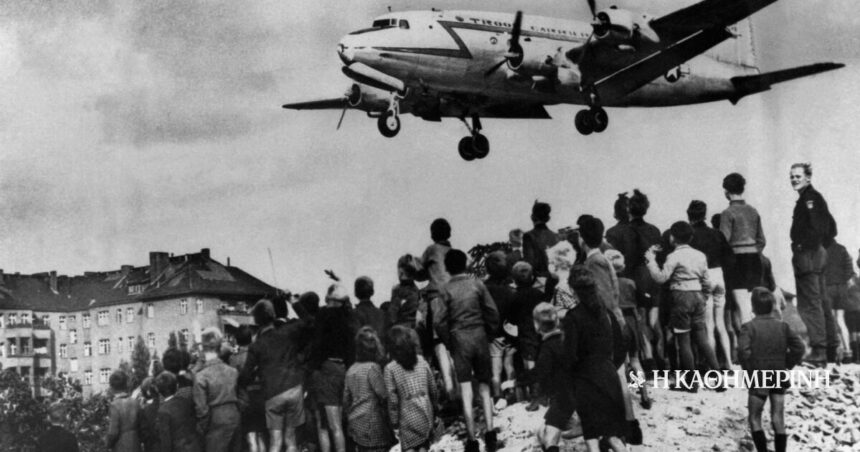“London, May 12 (ie) – As if the 12th hour, the Russian -controlled Berlin radio station reported the following announcement:” At that moment all road and commercial restrictions between its Russian zone Germany and the western zones, as well as the within Berlinin force as of March 1, 1948, are abolished by orders by the four occupation forces. “
With these words, the ‘Everyday»The news of the lifting of the Soviet blockade of West Berlin on May 12, 1949. For almost a year, from June 24, 1948, the Soviets had completely cut off access to West Berlin of Western Allies, seeking to blackmail their departure from strategically important city.
The end of the exclusion was not the result of a spectacular victory on the battlefield, but a product of hard, persistent diplomacy, smart strategy and unprecedented international determination.
The reason for the exclusion was given when the Westerners attempted to speed up the establishment of a new German state.
Berlin, although deep in the Soviet occupation zone of East Germany, had been divided into four areas since 1945. Western allies (US, United Kingdom, France) controlled the city’s western sectors while Soviet Union the east. With the onset of the Cold War, Berlin has turned into a microcosm of the geopolitical confrontation.
The occasion for exclusion was given in June 1948, when the Western allies attempted to expedite the establishment of a new German stateunifying the three western occupation zones and entering the introduction of a new currency, the West German Mark. Their aim was Germany’s rapid economic recovery and relieve the cost of military occupation. At the same time, they sought to limit the expansion of Soviet influence in Europe, especially after the monopoly assumption of power by the Communists in Czechoslovakia in February 1948.
The monetary reform and plans for a western, liberal German state triggered a strong reaction from the Soviet Union. In an attempt to impose its own position on the German issue, the Joseph Stalin He ordered the exclusion of Berlin, a western “islet” inside the Soviet zone. On June 24, 1948, Soviet forces interrupted all road and rail connections to West Berlin and suspended electricity and gas supplytrying to force the Westerners to leave through the economic and humanitarian “suffocation of the city”, which was 166 kilometers from the consolidated western zones.
Moscow began to realize that the exclusion reinforced the Western coalition instead of weakening it.
The Soviets believed that the exclusion would oblige Westerners to leave Berlin. But they underestimated their reaction: The famous airfield set up by USA and Britain exceeded all expectations. Daily, hundreds of aircraft supplied the population of West Berlin with necessary supplies. Moscow began to realize that, in the long run, exclusion reinforced the Western coalition instead of weakening it.
Since January 1949, backstage contacts began through the Four Great Foreign Affairs Committee (US, Britain, France, USSR). The negotiations reached an agreement on May 4, 1949in which the Soviets accepted the removal of exclusion and the restoration of communications in return for the launch of a four -member conference for Germany.
On May 12, the Soviet Union opened the border. Railways, streets and aquatic arteries to West Berlin reopenedas the first trains passed the Soviet guards, without obstruction.
The US and their allies not only maintained their presence in Berlin, but have gained international prestige.
“300,000 Berliners in the Western sectors and the Soviet abandoned the mostly ruined houses of two massive and peaceful demonstrations. Elders and young, healthy but also weak, rich and penny, all fibers participate in the other concentration to celebrate the expiration of the exclusion, “he said,”K»On May 12th. “The phalanxes that are heading to Under Den Linden Street of all parts of the Russian sector, brought a flag with inscription through which they were invited as supported by the election of the” conference of the German people “which will be held 16 and the 15th of the 15th. Earlier, the orators in the Western city municipal councils stated that the Arsis of the exclusion did not interfere with the “Cold War”. “For understanding and peace!” “For freedom and democracy!” These were the slogans that were exerted on a plate and flag on August’s Bebler Square in the Soviet sector. “
The end of the exclusion coincided with the emergence of Communist China under Mao.
The lifting of exclusion was considered a diplomatic defeat of the Soviet Union. The United States and their allies not only maintained their presence in Berlin, but gained international prestige. Their decisive attitude reinforced the sense of security in Europe, leading directly to the creation of NATOa few weeks earlier, April 4, 1949.
The crisis also had global implications. The expiration of exclusion coincided with the emergence of communist China under Maoproving that the Cold War was no longer an exclusively European affair.
The overpass continued to operate until autumn, until the land supply was completely restored. Although the Soviet retreat avoided armed conflict, the effects were long -term: The Federal Republic of Germany was established within a few months (West Germany) and then the People’s Republic of Germany (East Germany), validating the partition not only of the country but also of Europe.
Column: Myrto Katsigera, Vassilis Minakakis, Antigoni-Despina Poumenidou, Athanasios Syroplakis






